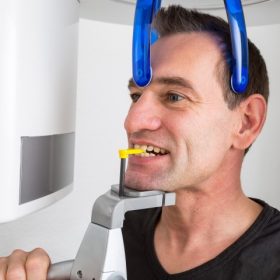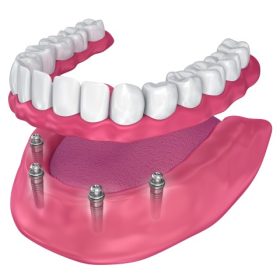Dental Implant

Dental implant, missing or damaged teeth replacement treatment, is a popular and effective solution in modern dentistry. It involves surgically placing an artificial tooth root made of biocompatible titanium into the jawbone. This artificial root serves as a sturdy foundation for attaching replacement teeth or dental prosthetics, such as crowns, bridges, or dentures.
Some essential information about dental implants:
- The Procedure: Dental implant placement typically involves a multi-step process. First, the dentist or oral surgeon surgically places the implant into the jawbone. After this initial placement, a healing period of a few months is required for the implant to fuse with the surrounding bone through a process called osseointegration. Once the implant has integrated successfully, an abutment is attached to it to connect the replacement tooth or dental prosthesis securely.
- Materials Used: Dental implants are mainly made of biocompatible materials, with titanium being the most commonly used. Titanium is well-tolerated by the body, which allows the implant to fuse with the jawbone without causing any adverse reactions.
- Types of Dental Implants: There are various types of dental implants available, depending on the patient’s specific needs and the condition of their jawbone. Endosteal implants are the most common type, placed directly into the jawbone. Subperiosteal implants are placed on or above the jawbone but below the gum tissue and are used in cases where there is insufficient jawbone for traditional implants.
- Advantages: Dental implants offer numerous advantages, such as improved chewing ability, natural appearance, enhanced speech, and prevention of bone loss that can occur when teeth are missing. Dental implants are a permanent solution that can last a lifetime with proper care.
- Candidacy: Most individuals who have lost a single tooth, multiple teeth, or even all of their teeth can be candidates for dental implants. However, a sufficient amount of healthy jawbone is required to support the implant. If the jawbone is inadequate, bone grafting may be necessary to build up the area before implant placement.
- Aftercare: Maintaining oral care practices, and dental check-ups, is crucial for the long-term success of dental implants. Avoiding unhealthy habits and maintaining a healthy lifestyle also contribute to the overall success of the treatment.
Dental implants have revolutionized the field of dentistry, providing a reliable and long-lasting solution for tooth replacement. They have significantly improved the quality of life for many individuals by restoring their ability to eat, speak, and smile with confidence. However, it is essential to consult with a qualified dental professional to determine if dental implants are the right treatment option based on individual dental health and needs.







